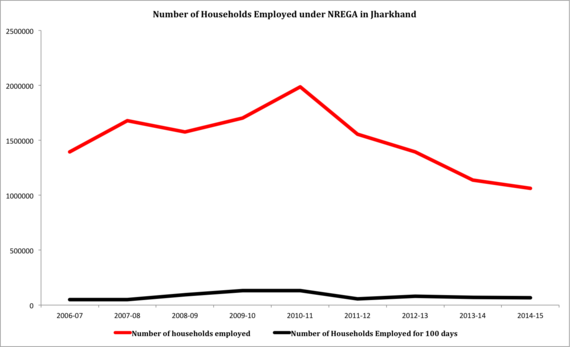Clik here to view.

The last day of September was the final deadline set by the central government to implement the National Food Security Act (NFSA). On paper, after seven earlier postponements, the Jharkhand government crossed this milestone by a whisker.
This ambitious food law promises two of every three Indians subsidised food grains all through the year. In Jharkhand 86% of the rural population is legally entitled.
But the ground reality of pervasive hunger in the drought-affected districts of a state with the second highest levels of malnutrition continues to be bleak.
A 10-day Jan Adhikar Yatra has been traversing the length and breadth of the state, culminating in Ranchi on 11 October. In every public meeting, villagers lamented their precarious access to food. No one had received new NFSA cards. In fact, the majority of people didn't even have ration cards, old or new. Of the lucky families who previously had cards, thousands now find that their names are missing from the new Socio Economic and Caste Census (SECC) lists. Misinformation on their entitlements is also rife. In this melee, on the cusp of a severe drought, middlemen are having a field day swindling the hungry.
The saga of guaranteed NREGA employment is similar. As one women in South Chotanagpur eloquently put it, "Jab card bante hai to kaam nahi milta hai, kaam milta hai to pai nahi milta hai, ghor kalyug sarkar huye, ke kara kucho sujhaye nai (If a job card is made, we don't get work, if we get work, we don't get paid, the present government has brought in the age of doom, what do we do)?"
Image may be NSFW.
Clik here to view.

Source: nrega.nic.in
The acute delay in wage payments has been a blow to families that survive hand-to-mouth. Last year, one-third of wages were paid after the stipulated 15 days. So, the central government's move to increase the guarantee from 100 to 150 days per household, to combat the drought, though welcome, is only a mirage. Last year only 7.4% of households in Jharkhand completed 100-days of work, with an average of only 40 days.
The kharif crop ruined by insufficient rains, in a state with only 12% irrigation, has acutely added to their woes.
But the real underlying reason for pervasive food insecurity is precarious access to forests and land. Across villages, people are waging a losing battle to claim their pattas under the Forest Rights Act. The spectre of the displacement is also omnipresent in a state suffused with mineral wealth. Many cases of mining companies grabbing lands by deceit have also been brought to light.
Image may be NSFW.
Clik here to view.

Fortunately, after sustained protests by civil society, the controversial Land Ordinance has been withdrawn from Parliament. But as the hard-hitting Akhra film Iron is Hot portrays, the real theatre of public outrage is in the wind-swept, dusty villages of mineral-rich central India.
The Jan Adhikar Yatra with loudspeakers blaring the theme song "Gaon Chodab Nabi" (we will not leave our villages) across four routes -- South Chotanagpur, North Chotanagpur, Palamu and Kolhan -- has witnessed first-hand the impact of the government's gross contempt for people's basic rights to survive with dignity.
The yatra converged in Ranchi on 11 October 2015 -- coincidentally, the state Food Minister Saryu Roy promised that on the same day new ration cards and subsidised food grains would be disbursed to all eligible beneficiaries. But it remains to be seen if the government will truly wake up to the real state of the food emergency in Jharkhand.
Image may be NSFW.
Clik here to view.
 Like Us On Facebook |
Like Us On Facebook | Image may be NSFW.
Clik here to view.
 Follow Us On Twitter |
Follow Us On Twitter | Image may be NSFW.
Clik here to view.